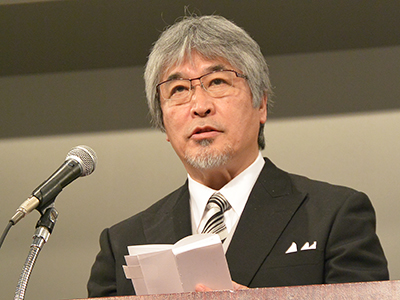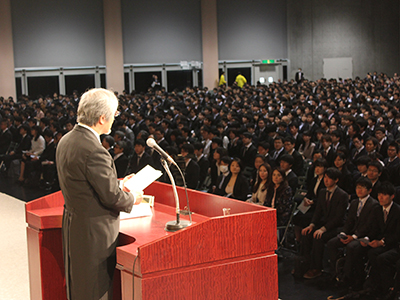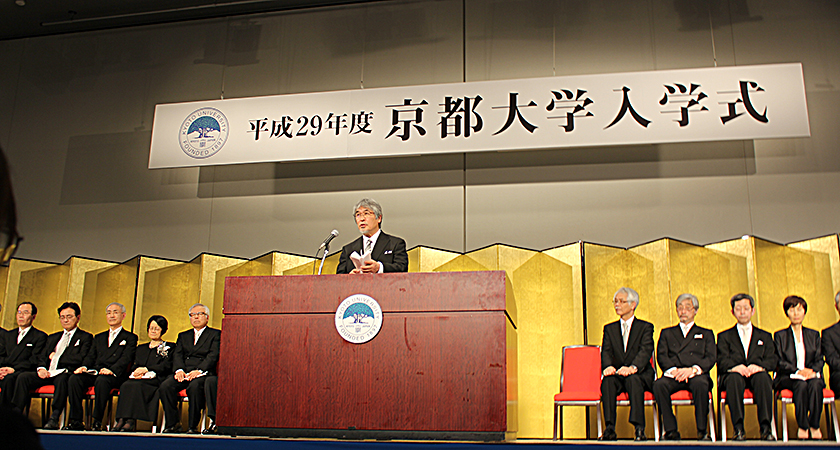Juichi Yamagiwa, 26th President

Today, Kyoto University welcomes 2,297 new students enrolling in master's programs, 306 in professional degree programs, and 825 in doctoral programs. On behalf of our guests of honor, former President Makoto Nagao and Professors Emeritus, along with the Vice-Presidents, Deans, and Directors here today, and all other faculty members and staff, I congratulate each and every one of you on your entrance into Kyoto University. I also extend my warmest congratulations to your families and others around you who have encouraged and supported you thus far.
You are now taking a new step toward mastery of your various academic disciplines. Kyoto University operates graduate schools across a wide range of disciplines, and awards 24 different types of academic degrees. The studies of our graduate students are supported by 18 graduate schools, 14 affiliated research institutes, and 17 other education and research facilities. Students in our master's programs are expected to gain advanced knowledge and skills and develop their abilities as researchers through classes, practicums, and fieldwork that build on the basic knowledge and expertise acquired at the undergraduate level. Professional degree programs include professional practicums, case studies, site surveys, and other activities in addition to regular classes, and provide many opportunities to learn from experts with extensive practical experience in the respective fields. Doctoral programs focus on the production of a doctoral thesis, and essential tasks for that purpose include data-gathering, analysis, and comparative review of findings with existing research. Moreover, we operate five Leading Graduate School Programs designed to equip students with the practical knowledge and skills to address challenges in contemporary society.
What is research, and what do we mean by the joy of research? Kiyoshi Oka was a mathematician who studied at Kyoto University's Faculty of Science and produced a number of research papers that astonished the world. In a series of essays titled Shunsho Juwa , Oka wrote as follows:
People often ask me what the point of studying mathematics is, but I believe that there is nothing wrong with a pansy in a spring field simply blooming as a pansy should. To bloom may be good or it may be bad, but that is not something over which the pansy has any control. The essential difference between blooming and not blooming is all there is. In my case, it is enough simply that I live on the joy I gain from my study of mathematics. That joy is nothing less than the joy of discovery.
Oka said that mathematical discoveries must always be preceded by tension, followed by a certain sense of release. You need to wait for something that was hidden in the lowest depths of consciousness to gradually mature and rise to the surface; when it finally emerges, the problem will resolve itself naturally. Discoveries in mathematics are always accompanied by an acute joy, explained Oka, and that joy is "like the feeling you get when you have gone out to catch butterflies, and find a beautiful specimen sitting there in a tree". Oka also advocated the importance of emotion in science, and said that being moved emotionally by nature often leads to new discoveries.
Oka's life as a researcher was out of the ordinary. He studied in France and worked as a university faculty member, but cut short his academic career in his mid-30s to begin working as a farmer. He continued his intellectual endeavors while cultivating the land, and achieved several major mathematical breakthroughs in succession. It is said that Oka's famous theory of functions of several complex variables was generated not by theorizing, but through the workings of emotion. Oka said that farming was the closest he could get to mathematics: both occupations involve planting and nurturing seeds, and their originality lies in making "something" out of "nothing". If mathematicians select the right seeds, it is simply a matter of watching them grow; the capacity for such growth lies within the seeds themselves. Oka also stressed that both science and art have their foundations in the power of intuition, meaning that to gain a mastery of mathematics it is important to cultivate your emotional sense through art and literature. He said that the goal of mathematics is harmony in truth and the goal of art is harmony in beauty; emotion is at work in both of these. What they share is a concern with harmony, but the harmony in beauty is more readily apprehended, and engaging great art is thus the best means by which to grasp the nature of harmony in truth.

In some way I feel that I understand what Oka was suggesting. My field studies in primatology have involved observation of wild gorillas in the tropical rainforests of Africa. This area of research appears to be completely unconnected to mathematics, but I believe that emotion is also an important part of identifying new meanings in gorilla habitats and behavior. For more than 100 years since being discovered by Westerners in the middle of the 19th century, the gorilla was viewed as a violent, belligerent beast with a savage disposition. This view was based on an interpretation of the gorilla habit of beating right and left hands alternately upon the chest, known as "drumming", as a declaration of battle. As researchers began observing gorillas' behavior in their own groups, however, it became clear that drumming is an act of self-assertion, and if anything a strategy to avert direct confrontation. The misinterpretation was therefore corrected by a new outlook on nature born in the 20th century, an emotional conviction that a malicious and excessive aggression to the point of seeking to eradicate one's enemies would never thrive in the natural world. The same skepticism was then directed toward humans themselves, and the idea formed that perhaps human nature is not essentially violent. I focused on the fact that gorillas' drumming appeared identical to the way actors strike exaggerated poses in Kabuki theater. Kabuki poses are not "winning" stances designed to make others succumb; rather, they are "unyielding" stances. I started to think that the gorillas were intent on avoiding a fight while also saving face, and that this perhaps was the true essence of gorilla sociality. It dawned on me that the bodily postures expressed in distinguished performing arts, rather than logical expression, could serve as a valuable reference for understanding the behavior of apes, animals that are extremely close to humans in systematic terms.
Kyoto University does not have a faculty of the arts, but artistic activity does thrive here. The Kyoto University Symphony Orchestra, which celebrates its centennial this year, has produced numerous outstanding conductors and performers. There are surely many people who have pursued musical endeavors at the same time as working in the academic world, and from them gained valuable ideas and intuitions for research. Kyoto University is located in an ancient capital with a 1200-year history. Here it is possible to observe numerous artistic creations and elaborate works of architecture at close range. Artisans across a wide variety of fields carry on ancient traditions and work tirelessly to create new forms of beauty. Researchers at Kyoto University can feel these things first-hand and apply them to their original academic endeavors.
Today, university research is expected to contribute to the development of industry, but this does not mean that Kyoto University only encourages research that is of immediate use in wider society. Since its establishment, our university has upheld the tradition of academic freedom based on dialogue and fostered a spirit of creativity. These traditions generate diverse learning activities and research inspired by new ideas. You are about to embark on research of a highly specialized nature, but this does not mean plunging headlong down a narrow path. Enriching your own ideas through dialogue with many fellow students and researchers in other fields will help you find pathways toward the truth. Today you begin your graduate studies at Kyoto University, but one day you too may diverge from your own fields of specialization and delve into other areas of academic inquiry. I believe that such divergence is a chance to open up new possibilities for you and lead to great advancements equal to any success in your own field. Immerse yourself in your research with no fear of failure as your interest dictates. I am confident that Kyoto University can provide you with an environment equal to your ambitions.
There are 36 research units at Kyoto University engaged in a variety of interdisciplinary activities having to do with education and research. There are education programs and research projects underway that involve multiple graduate schools, research institutes, and research centers. I encourage you to participate in these programs and projects in order to open your eyes to the diversity of academic endeavor and to enhance your own creative powers. Our university is also home to five Leading Graduate School Programs in which students complete doctoral degrees and go on to leadership roles in applied settings: the Graduate School of Advanced Integrated Studies in Human Survivability (Shishu-Kan), the Inter-Graduate School Program for Sustainable Development and Survivable Societies, the Training Program of Leaders for Integrated Medical System for Fruitful Healthy-Longevity Society, the Collaborative Graduate Program in Design, and the Leading Graduate Program in Primatology and Wildlife Science. Specific graduate schools work in partnership with each of these programs. I encourage you to find out more about them. In addition, in recent years there have been many cases of data manipulation, plagiarism, and other improper conduct in the production of academic papers, and researchers are coming under strict public scrutiny. It is my sincere hope that you will all observe the ethics of research, pursue highly original projects, and produce findings of great significance.
In Japan, it has often been said that students with doctoral degrees find it difficult to secure employment in industry. In recent times, however, as many employers move to become more internationalized, we are beginning to see signs of more proactive recruitment of people with doctorates. It is therefore important for graduate students to gain insights into actual workplaces while they are still enrolled. To this end, the university operates an Industry-Academia Innovative Human Resource Development Consortium project involving many companies to offer medium- and long-term internships and matching services. We hope to expand the opportunities for our students to gain hands-on industry experience before completing their studies and to experience fields suited to their own abilities and research interests. Additionally, in order to cultivate students' abilities to play active roles in the international arena, we are working to offer more double degree and joint degree programs with leading universities overseas. Through international offices in London, Heidelberg, and Bangkok, we are strengthening our ties with universities in Europe and Asia. This year, a new office is also scheduled to open in North America in order to expand the opportunities for inter-university exchange. Many of Kyoto University's faculties, schools, and institutes already have their own networks and bases for exchange with other researchers around the world; these will be used to advance joint research and student exchange, extending our capabilities and opportunities for international engagement.
In all these ways, Kyoto University is working to enhance its education and research activities and to help our students lead a secure and fulfilling life. To support these initiatives, we have established the Kyoto University Fund. The families who are here today have been given leaflets explaining the Fund as well as details of a special plan put together in celebration of your entrance. I would be grateful if you could all take the time to read through the material provided and for any support you feel moved to provide.
Once again, I offer my sincere congratulations to each and every one of you on your entrance into the Kyoto University Graduate Schools.


